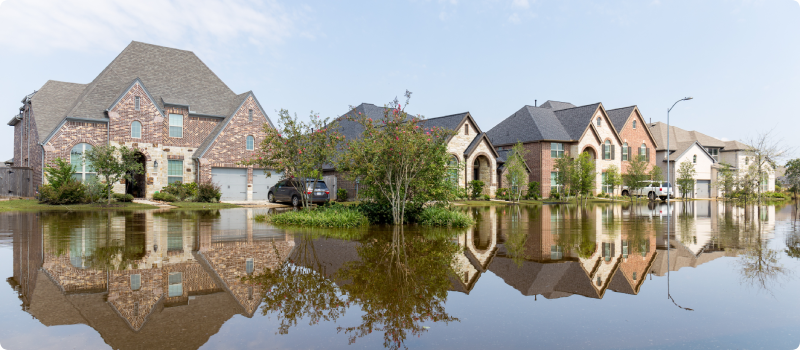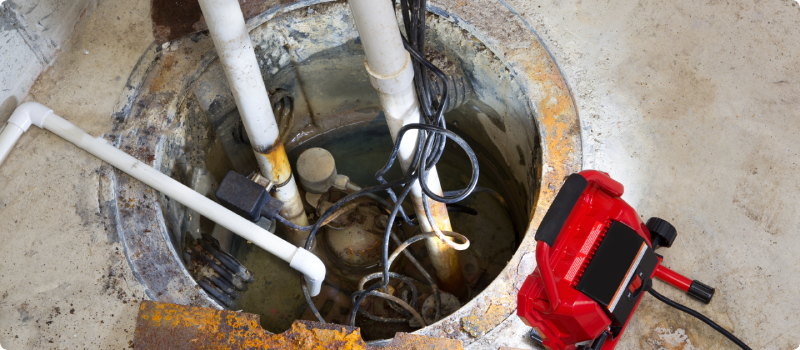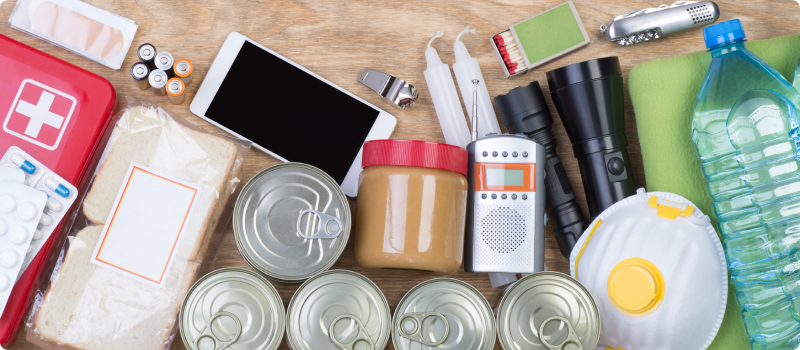
Does insurance cover rain and flood damage?
Updated March 7, 2024 . AmFam Team
You can depend on your home insurance policy for financial help after certain types of water damage caused by rain. But qualifying for coverage really depends on the source of the water and on how the damage occurred. For instance, if a storm opens a hole in your roof, and water to leaks in and your valuable personal property is destroyed, your homeowners policy typically provides insurance coverage.
But what about insurance for floods? Although most homeowners policies don't cover flood damage, options for additional protection are available. You can pick up coverage for floods with the National Flood Insurance Program, and that can make a big difference when the water starts to rise near you.
Let's take a look at what you can do to help ensure your home is protected from rain and flood damage.

Does homeowners insurance cover water damage from rain?
With American Family Insurance, your base homeowners policy provides replacement cost value (RCV) coverage for losses to your dwelling other than losses to your roof caused by wind and hail. If your roof is eligible based on its age and type (e.g. shingles, tiles, slate, wood shake, etc.), roof replacement cost coverage for windstorm and hail is an optional coverage that is added to your policy. When active, you’ll have coverage for the full cost to repair or replace your roof.
If your roof doesn’t qualify, your homeowners policy will provide actual cash value (ACV) coverage. Your roof’s ACV is calculated by starting with what it would cost to repair or replace it new today, and then subtracting depreciation for factors such as age, condition and obsolescence.
Take a look at the following scenarios and learn about how rain damage is managed by your homeowners policy:
When rain enters from storm damage
If the wind from a thunderstorm blew a tree over that punched a hole in your roof — and rainwater poured into your home for half an hour — you’ll likely be covered.
When rain, snow and ice infiltrate your roof
Ice dams can form when snow melts on your roof and the water re-freezes into large icicles across your gutters. That repeated freezing and thawing can stress shingles. Then water damage to the interior of your home, including the ceiling and walls, can occur under the right conditions. When water damage results suddenly and unexpectedly from a change to the protective shell of your home due to an ice dam situation, your homeowners insurance will provide coverage.
When vandalism results in rain damaging your home
Suppose the picture window in your living room is broken by vandals while you’re away on vacation. And after arriving home, you find heavy rains have resulted in water damage. Your homeowners coverage will probably help cover the costs to make repairs and restore your home.

When is damage from rain not covered by homeowners insurance?
Is all rain damage covered by insurance? It's an all-too-common question homeowners ask, sometimes after the damage is already done. There are some instances when rain damage is not covered with your homeowners policy. Take a look at a few common issues that usually aren’t covered:
When the water damage is gradual
If rainwater seeps into your basement through cracks in the foundation, or if water flowed in through an egress window over time, you won’t be covered with a standard homeowners policy. In most cases, coverage will apply when the water damage is sudden and accidental in nature. If temperatures dip below zero and a frozen, burst pipe damages your washing machine and utility room, your home coverage can help with repair or replacement costs.
When water damage is the result of negligence
A poorly maintained roof can unleash a flood of rainwater into your home that may not be covered. When your roof isn’t maintained properly, it can fall into disrepair and the resulting damage may not be covered with your homeowners policy.
Does homeowners insurance cover water damage from floods?
Your standard homeowners insurance policy doesn’t provide protection for flood damage. However, you can purchase a separate flood insurance policy through the National Flood Insurance Program (NFIP). Most flood events don’t result in a Presidential Disaster Declaration, homeowners who experience flooding in their homes shouldn’t rely on federal disaster aid.
Given the right circumstances, you may be able to file a claim for flood damage with the National Flood Insurance Program with active coverage. To give you an idea, here are just a few ways this flood insurance policy helps protect your home.

What does the National Flood Insurance Program (NFIP) cover?
You’ll find important coverage with a NFIP policy, which can be purchased through your American Family Insurance agent. It can offer a lot of peace of mind if you’re living in a floodplain or your area’s prone to frequent flooding. Here’s a sampling of what’s covered under the NFIP:
- Your home’s foundation and staircases attached to it
- Your home’s plumbing and electrical systems
- Fuel tanks on your property and the fuel within them
- Solar panels and related energy equipment
- Well water pumps and storage tanks
- Heat pumps, sump pumps, furnaces and water heaters
- Built-in appliances like dishwashers as well as refrigerators, stoves, etc.
- Cisterns and the water they contain
- Carpeting that’s permanently installed over unfinished sub-flooring
- Unattached garages
- Drywall, wallboard, paneling, cabinets and bookcases
- Window blinds
What’s not covered under the NFIP?
Is all flooding covered by insurance? Not necessarily. Because of that, it’s important to know what exclusions apply under the NFIP. Take a look as some of the ways you won’t be allowed to file a claim for flood damage when enrolled in the National Flood Insurance Program:
- Any currency, valuable papers like stock certificates and precious metals lost or destroyed
- Preventable mold or mildew damage that’s not related to the flood
- Earth movement events even if the flood caused the damage
- Cars and other self-propelled vehicles
- Trees, plants, wells, decks, patios, septic systems, pools
- Financial losses that are the result of your business being interrupted by the flood
- Additional living expenses you may need while your home is being repaired
- Loss of use or access to the property
How much does flood insurance cost?
According to the Federal Emergency Management Agency, the average flood insurance policy costs around $450 annually. But keep in mind that the average flood insurance claim costs $39,000. Your specific rate will depend on where you live, your property and other factors, so talk to your agent to learn about purchasing National Flood Insurance Program coverage.
How to file an insurance claim for rain or flood damage
Rain damage happens when you least expect it. But with American Family, we’re an insurance company that will help you recover from water damages in your home as quickly as possible. And if you’ve purchased a separate National Flood Insurance Program policy and your home experiences flooding, we’re going make sure you get the help you need.
Here’s how to file a claim:
Log into My Account or use the MyAmFam app. And by initiating your claim with one of these options, you’ll also experience additional benefits including:
- Filing anywhere, any time
- Tracking the status of your claim
- Easily communicating with your claims representative by email or phone
You can always call us at 1-800-MYAMFAM (1-800-692-6326) to speak directly with a claims representative or contact your American Family Insurance agent.

Flood safety and protection tips
When your neighborhood is under a flood warning and watch, it’s time to act quickly. Because floods can knock out power and limit access to and from your area, it’s important to also have a plan in place. Take a look at these ideas to help you weather the storm when floods are headed your way:
1. Prepare in advance
Make a natural disaster kit and store it in a protected area, away from potential floodwaters. Pack it with an emergency wind up radio, batteries, flashlights and protein bars.
2. Stay aware of changing conditions
As flood waters advance, new warnings and details about affected areas will be reported. Download a weather app that references multiple weather sources. This is key for getting the forecast right and can make a big difference when the water starts to rise. Consider apps like Dark Sky and Carrot Weather for early warning and real-time flood warning maps.
3. Move valuables out of harm’s way
Relocate family heirlooms, expensive electronics and other items that can be relocated. Store them safely in an area away from potential floodwaters.
4. Create a communication tree
Long before any foul weather or flooding occurs, take time and talk with your family about the ways you can stay in touch during a power outage or weather emergency. Use social media to set up a friends list so you’re ready when you need it.
Find the homeowners coverage you need today
As a homeowner, it’s so important to have the right coverage in place before you need it. With the help of your American Family Insurance agent, you’ll be able to review your coverage options and choose insurance that best suits your home and your needs. With it, you’ll have more peace of mind when the weather turns.
This article is for informational purposes only and includes information widely available through different sources.
This information represents only a brief description of coverages, is not part of your policy, and is not a promise or guarantee of coverage. If there is any conflict between this information and your policy, the provisions of the policy will prevail. Insurance policy terms and conditions may apply. Exclusions may apply to policies, endorsements, or riders. Coverage may vary by state and may be subject to change. Some products are not available in every state. Please read your policy and contact your agent for assistance.
*Customers who bundle an auto policy with their home policy may save up to 23% on their auto policy (as of December 2023). Discounts may vary by state, property, policy form and company underwriting the policy. Discounts may not apply to all coverages on an auto policy.

